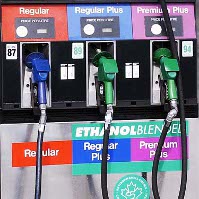 At this time in our nation, when fuel prices are increasing at an alarming rate, we can save money at the pump if we understand fuel octane and how it affects our vehicles.
At this time in our nation, when fuel prices are increasing at an alarming rate, we can save money at the pump if we understand fuel octane and how it affects our vehicles.
Modern engines use fuel injectors run by computers to accurately control their air/fuel mix. In order to get an accurate air/fuel mix in the fuel injectors and computers, the proper fuel must be used for that engine. The difference in the name and price of the fuel is based on the gasoline’s “octane”. In order to determine a fuel octane rating, the fuel is subjected to two testing methods, the motor method and the research method. The motor method runs the gas in an engine running under load, and the research method runs the gas in a free-running engine. The fuel octane rating is the average of those two tests.
The fuel octane rating tells you how much the fuel can be compressed before it spontaneously ignites. In internal combustion engines, the compressed fuel-air mixtures have a tendency to ignite prematurely rather than burn smoothly, and when gas ignites by compression rather than because of the spark from the spark plug, it creates engine knock, a rattling or pinging sound in one or more cylinders. The fuel octane rating is a measure of a fuel’s resistance to engine knock.
Regular fuel has a an octane rating of at least 87. The octane rating of “mid-grade” gasoline ranges from 88-90. “Premium” fuel octane can vary depending on the state where it is purchased but is usually higher than 90 in most states.
Most vehicles today are designed to run on Regular 87 octane fuel, but it’s a good idea to check your owner’s manual for the correct fuel octane rating recommended for your vehicle. Some people have the mistaken idea that if you use a higher octane fuel in your car, you’ll increase the engine’s power or get better mileage. High octane fuel doesn’t do a better job than regular octane gas in preventing engine deposits from forming, or removing them, or in cleaning the engine. If your vehicle is designed to run on 87 octane, a higher octane fuel won’t improve mileage or increase its power. If your engine runs well and doesn’t knock or ping on low octane fuel, than you don’t need to spend more money on a higher octane. Don’t pay a premium price for something that you don’t need.
For all of your Denver Auto Repair needs, trust Express Car Care. Give us a call at (303) 691-2760 or stop by our shop today.

Leave a Reply
You must be logged in to post a comment.